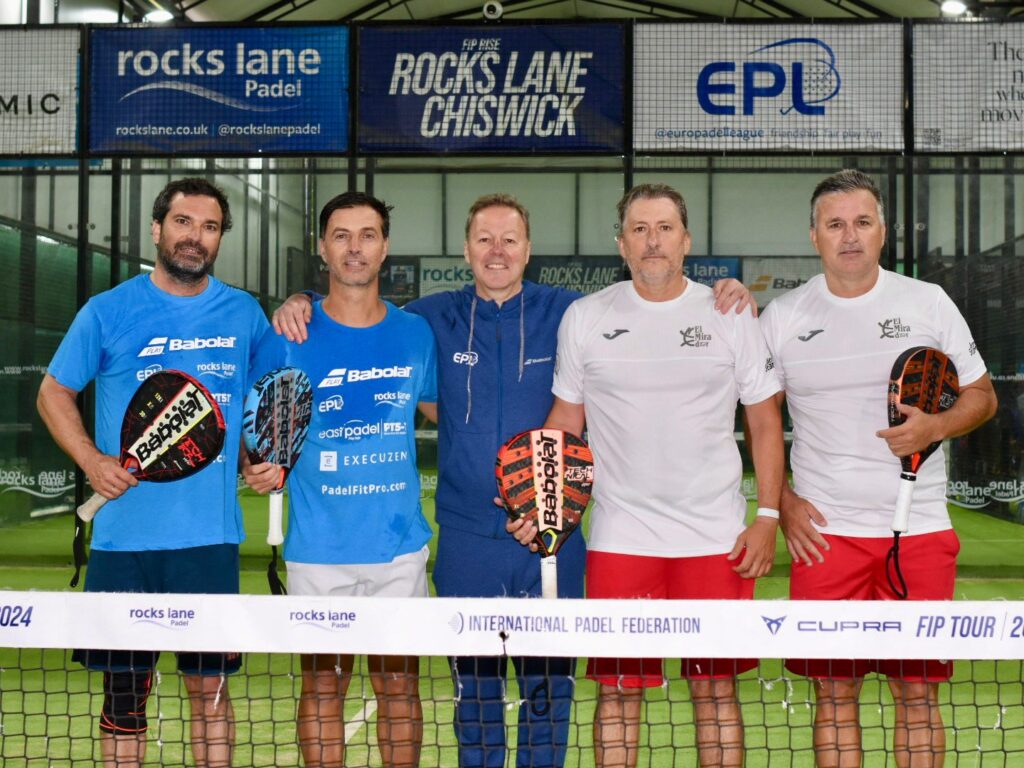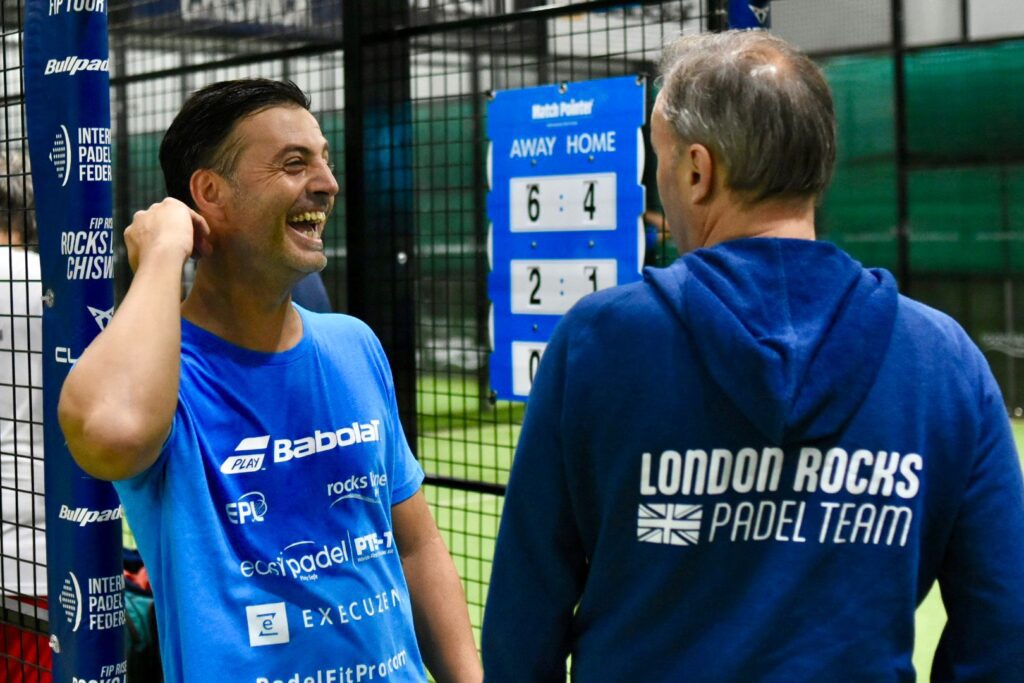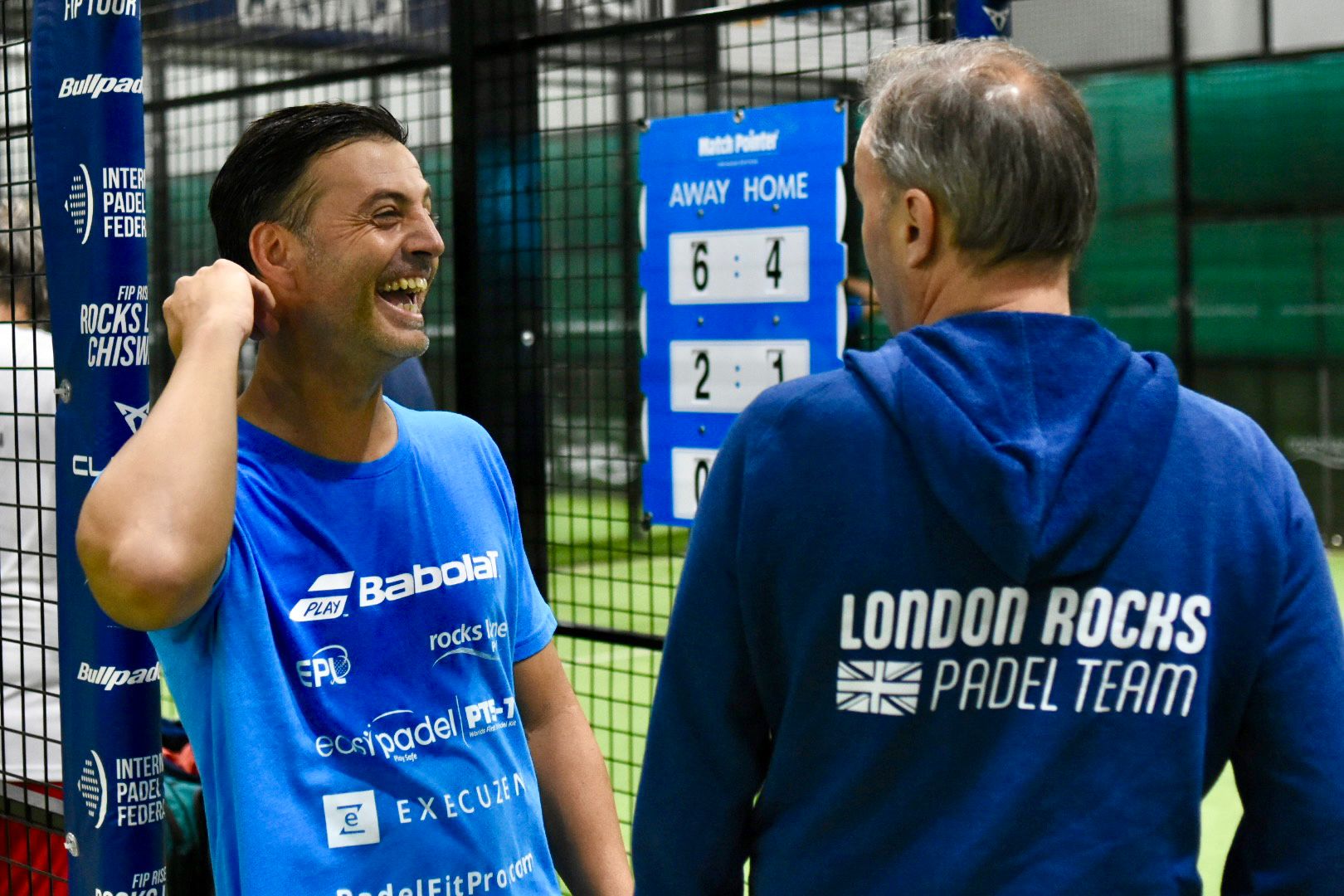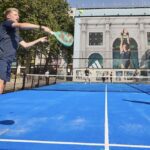Warren’s blueprint for developing stars of the future
Developing the UK’s next crop of young padel players has become a hot topic – and now Rocks Lane founder Chris Warren believes he may have a blueprint for how the industry can work together – and with padel governing body the LTA – to the benefit of our talented youngsters. Lee McLaughlan reports.
Padel’s rapid growth has brought with it challenges, with one of these being how to attract, retain and develop young players. One man who wants to use his experience to make a difference is Chiswick’s Rocks Lane Padel owner Chris Warren.
“I think a lot of clubs need a lot of guidance in terms of setting up programmes as it’s been very adult focused so far,” he said. “If you want to develop a junior programme you’ve got to motivate the children to come along and the parents to get them there. You have then got to continually motivate the children to come back. I do think it’s easier to achieve this in padel. It’s easy to engage children in the game unlike tennis as the technique is more difficult.”
“padel has a big opportunity with juniors but you do need to have motivated individuals at clubs to push the programme. Maybe this is something the LTA can help with. It’s definitely something I want to help with.”
- Chris Warren, Rocks Lane Padel, Chiswick London

“I’ve been at this for 30 years as an operator and there are two key elements. One is filling off-peak times and the other is investing in children as they are the future of your business.
Spotlight
The recent departure of Matt Stanforth, the LTA’s head of padel performance, combined with the LTA’s decision not to enter a team in the forthcoming FIP Juniors European Championships has turned the spotlight on padel’s governing body and raised questions as to its junior player development programme and ambitions.
In August 2023, Stanforth told the LTA’s website: “The youth side of the pathway is now a big focus for us, and we need to think about how we bring the next crop of players through and how we keep them on that journey and sustain success for the long-term future.”
However, junior development has to be tackled by all stakeholders – not just the LTA – who want to see more juniors introduced to the sport. That’s the first objective. The second is to ensure the country’s most talented junior players have a platform and pathway to compete not only against their peers in the UK but also internationally.
Chris has been involved in racket sports for more than 30 years as a player and padel operator and is prepared to be a driving force in developing a UK-wide structure that will establish a more workable and robust solution.
As one of the UK’s premier padel pioneers, his padel empire includes six centres which currently have 24 padel courts. Rocks Lane in Chiswick has 12 courts, has hosted FIP Rise international tournaments and has welcomed some 13,000 players to the venue. It also has a vibrant and successful junior academy with 200 regulars in the programme, rising to more than 500 on the back of its partnerships with 16 local state schools and three universities.
Regional hubs
Chris sees the first stage is bringing clubs into the fold and identifying those that want to grow a sustainable junior development programme. To assist in this he has approached iPadel League founder Ian Colligon, another stalwart of the UK padel scene.
“I spoke with Ian who has great connections with a lot of clubs, and one way we could help those clubs is to give advice on developing junior programmes and academies,” said Chris.
“If you look at the current structure it’s stretched across club, county, regional and national. There’s a lot of replication there and that also means you are using a lot of resources at county and regional level. We need to reduce the duplication. Look at locations and facilities which can be a regional coaching hub.
“Padel could look at that and develop juniors through the clubs. I spoke to Matt Stanforth and he wanted to go down that route. Hot spots are what he called them. You’d have certain clubs that would take on the role of being a regional hub to support and deliver this. This would focus on club and country and you’d cut out the middle and all that duplication.
“Children want to develop with one coach. They don’t want all those different coaches. So you have these academies with excellent coaches. I think that’s the blueprint.”
LTA role
The changes Chris is suggesting would also see a change in how the LTA oversees junior development. He said: “I think there’s a great role for the LTA and that’s to be enablers. They can enable the development of the sport and work in partnership rather than trying to do it all themselves.
“The LTA has a role to help with funding but not for total control of junior development. I think it can identify those clubs that have the structures to support regional hubs but there also has to be a free market element as well.
“Another initiative would also be for the LTA to fund prize money for junior players in the form of coaching vouchers or scholarships that can be used for developing the child. I think this would make a real difference in player development.
“The LTA has limited resources for padel as most of its resources go to tennis. So the LTA should utilise the clubs that want to be involved and also the private sector. In padel, the private sector is far more prevalent than it is in tennis, as that’s what driving it. I say to the LTA let’s genuinely work together in partnership to develop padel.”

Rocks Lane route
To understand his plans it is worth understanding the Rocks Lane Padel academy model, which is overseen by former World Padel Tour player Alex Grilo.
“We have a development pathway that all the coaches follow. That’s not just for the good players but for anyone that wants to get involved,” said Chris. “We open up our facilities to the local state schools who can come and use it for free, they get free equipment and we also offer the use of a padel coach. All of this is subsidised from the hiring of the courts.
“For the regular junior sessions, any child that wants to play, it’s £2 per child. Any child that wants coaching, that’s at the commercial rate, but if they are in one of our performance squads there are subsidies, with funds for this raised from commercial activities from the likes of the European Padel League.
“In terms of our performance squads, we also have talent identification sessions where juniors are put into groups relevant to their age and standard. We have three age groups, 6-9, 8-12 and 11-15 years and you can see there’s quite an overlap at the moment. At each level they get the opportunity to play local tournaments, national tournaments and international tournaments.”
Chris also suggested clubs must look to take advantage of after-school off-peak hours and school holidays to bring in more juniors: “I’ve been at this for 30 years as an operator and there are two key elements here. One is filling those off-peak times and the other is investing in children as they are the future of your business.
“Capitalise on this with the 4-6pm window and holiday times. The amount of holiday time is phenomenal. There’s 13 weeks from 9-6pm to run programmes for children. If clubs have an opportunity to do it, then they should take it.”
International experience
Chris is a firm believer in the country’s junior players having the opportunity to test themselves against their peers from across Europe and beyond. He was a professional tennis player and coach and has played international padel for GB at a number of World Seniors Padel Championships.
He stressed that international tournament experience is crucial to a player’s development and while the LTA has chosen not to submit a GB team to September’s FIP Juniors European Padel Championships, Rocks Lane will be sending its own players to compete in the open event.
In addition, Warren is looking to again boost Rocks Lane international standing by hosting the UK’s first FIP Promises tournament, which caters for junior boys and girls.
“There hasn’t been a FIP Promises event in the UK but we’re hoping to organise one at Rocks Lane so the juniors can see what standard they are at,” he said. “I feel it’s important that children compete at all levels. That’s why it’s so important that our juniors compete in tournaments like the European Championships. You’ve got a lot of countries involved in that like Estonia, Lithuania, Ireland and these are countries with very few padel courts.
“It’s disappointing that we have junior players out there playing for four or five years, my son is one, who are not going to get that opportunity to compete at a major championship. It’s important to be involved as the experience is so vital.
“I remember when I played my first international tournament and it was very daunting – and that was as an adult. Once you get through that first year you feel you belong and have that experience which is going to be a huge help in your growth.”
Junior GB squad
The LTA has run a series of sessions bringing together the country’s talented youngsters. In addition to Chris’s plans for regional hubs is a tournament structure to complement this to identify the right talent for GB junior teams – and ensuring there are enough talented players to enter major international championships.
“With GB National squad training camps, one of the problems is there isn’t a lot of large facilities to host the number of children that attend these camps,” he said. “However, with effective regional hubs you would only need to bring everyone together occasionally, such as the build-up to a tournament when the LTA is choosing a team for a championship.
“While it’s important to have the right selection criteria, it is also important to have the right tournament structure. There needs to be a junior development circuit of tournaments, say eight regional and four national tournaments. The performance manager then goes to those tournaments and can see the standard of play which will help with selection. The one issue at the moment is this potentially isn’t feasible until we get a greater density of courts and centres.”
Coach development
The final requirement, believes Chris, is ensuring there are sufficient coaches, which is one of the biggest challenges in UK padel.
“We need to have the right coaches and more of them. We have British-based coaches and they gain a lot of experience from Spanish and Argentinean coaches, which was much easier before the Brexit rules.
“We need to grow our numbers and expertise as British coaches as they are important to the overall growth and development of our sport. However, I do feel they may have to go to Spain to get the experience they need.”
The coaching issue was address by the LTA’s head of padel Tom Murray in his 2023 review. He said: “Without enough coaches all venues, player pathways, etc are going to struggle – so training up enough coaches to support our player-base and meet demand is something we need to focus on.”
Clubs wanting to discuss junior development with Chris should contact via him e-mail: chris@rockslane.co.uk 🎾





